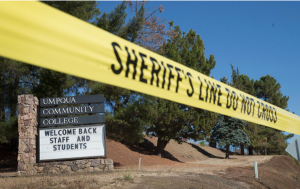The Democrats — ever vigilant for improper mixing of politics and religion — opened yesterday’s news conference announcing their proposed “assault weapons” ban with a prayer from the dean of the National Cathedral, the Canon Gary Hall. As Drudge highlighted yesterday, he made brief remarks before the prayer and said, “Everyone in this city seems to live in terror of the gun lobby . . . but I believe that the gun lobby is no match for the cross lobby.”
I have no objection to the reverend speaking his mind. In fact, I’m glad for clergy to contribute their thoughts to the gun-rights debate. My objection is to the substance of his position, not his participation in the debate. Simply put, self defense is a Biblical and natural right of man, and I fear that his words imply otherwise. There is nothing about the cross that requires me to allow someone to kill my family — or anyone else for that matter. Indeed, I have a moral imperative to come to the aid of those in distress.
Many months ago, I outlined the Christian argument for self defense at some length in my Patheos blog, and I won’t repeat it in its entirety here. There are, however, several key points to make:
First, it has always been clear that human life is precious — so precious, in fact, that throughout time God has mandated the ultimate penalty for unlawful killing. Among God’s first words to Noah after the Flood subsided was this declaration of the importance of human life and the price paid for spilling human blood: “Whoever sheds the blood of man, by man shall his blood be shed, for God made man in his own image.” (Genesis 9:6) This statement is not made to a nation-state or to a police force but instead to a small band of people who are rebuilding human society from the ground up. While obviously not specifically addressing self-defense, by establishing that fundamental principle the Biblical commands and examples that follow demonstrate how God expects us to protect life in the real world.
In Mosaic law, God obviously continued his mandate of the death penalty for murder (as well as for blasphemy and other crimes) — but not for all killing. He specifically carved out an exception for the defense of one’s home: “If a thief is found breaking in and is struck so that he dies, there shall be no bloodguilt for him . . .” (Exodus 22:2). There was bloodguilt if the thief was killed during the day, however. Note the grace that God gives the citizen in the midst of the fear and ambiguity of a nighttime invasion — even a “thief” (not a rapist, not a murderer) can be killed at night, but in the clarity of day, the “thief” (again, not a rapist, not a murderer) should not be killed.
Second, the morality of self-defense is not only presumed, the act of self-defense is permitted and even mandated by key Biblical figures. This principle flows of course from a moral law that reveres human life. It should be protected, not merely avenged. Nehemiah, when he was rebuilding Jerusalem in the face of hatred (not in wartime, but when tribal neighbors were seeking to carry out vigilante attacks on Jews) instructed his people: “Do not be afraid of them. Remember the Lord, who is great and awesome, and fight for your brothers, your sons, your daughters, your wives, and your homes.” (Nehemiah 4:14).
It’s often-forgotten that the climax of the Book of Esther involves the Jews gathering together in an act of self-defense, where a despotic king was persuaded to allow them to fight against their attackers: “The king allowed the Jews who were in every city to gather and defend their lives, to destroy, to kill, and to annihilate any armed force of any people or province that might attack them, children and women included, and to plunder their goods.” (Esther 8:11). The Jews then “struck all their enemies with the sword, killing and destroying them, and did as they pleased to those that hated them.” (Esther 9:5). Before Esther’s intervention, the king would have denied the Jews their right of self-defense. After Esther’s intervention, the Jews didn’t merely look to law enforcement for salvation but took matters into their own hands.
While the New Testament certainly removes from the individual Christian any justification for vengeance (leaving vengeance to God’s agent, the state) – lex talionis (eye for an eye) was always a rule of proportionate justice, not self-defense. In fact, Jesus’s disciples carried swords, and Jesus even said in some contexts the unarmed should arm themselves. The sword’s use was only specifically forbidden when Peter used violence to block Christ’s specific purpose to lay down his life.
The idea that one is required to surrender his life — or the lives of his family, neighbors, or even strangers — in the face of armed attack is alien to scripture. There are many examples of martyrs surrendering their lives in the face of evil, but such an act is highly contextual and in response to the individual call of God on a man (or woman’s) life. I know of no precedent for the idea that we are called to surrender the lives of others (such as our spouse, children, or neighbors) in response to deadly attack.
Third, these understandings are so ingrained in Western moral tradition that John Locke, in his Second Treatise of Civil Government, described the right of self defense as a “fundamental law of nature”:
Sec. 16. THE state of war is a state of enmity and destruction: and therefore declaring by word or action, not a passionate and hasty, but a sedate settled design upon another man’s life, puts him in a state of war with him against whom he has declared such an intention, and so has exposed his life to the other’s power to be taken away by him, or any one that joins with him in his defence, and espouses his quarrel; it being reasonable and just, I should have a right to destroy that which threatens me with destruction: for, by the fundamental law of nature, man being to be preserved as much as possible, when all cannot be preserved, the safety of the innocent is to be preferred: and one may destroy a man who makes war upon him, or has discovered an enmity to his being, for the same reason that he may kill a wolf or a lion; because such men are not under the ties of the commonlaw of reason, have no other rule, but that of force and violence, and so may be treated as beasts of prey, those dangerous and noxious creatures, that will be sure to destroy him whenever he falls into their power [emphasis added].
Moreover, these fundamental laws of nature were inseparable from the will of God:
The rules that they make for other men’s actions, must, as well as their own and other men’s actions, be conformable to the law of nature, i.e. to the will of God, of which that is a declaration, and the fundamental law of nature being the preservation of mankind, no human sanction can be good, or valid against it. (emphasis added; thanks to Jim Lindgren for highlighting these excerpts in an excellent 2008 Volokh Conspiracy post)
What does all this mean? Essentially that gun control represents not merely a limitation on a constitutional right but a limitation on a God-given right of man that has existed throughout the history of civil society. All rights — of course — are subject to some limits (the right of free speech is not unlimited, for example), and there is much room for debate on the extent of those limits, but state action against the right of self-defense is by default a violation of the natural rights of man, and the state’s political judgment about the limitations of that right should be viewed with extreme skepticism and must overcome a heavy burden of justification.
In other words, I don’t think Reverend Hall should be so confident that the “cross lobby” is on his side.
Editor’s Note: See David’s response to his critics here.
This article first appeared on National Review, where it created much controversy. See it here.










